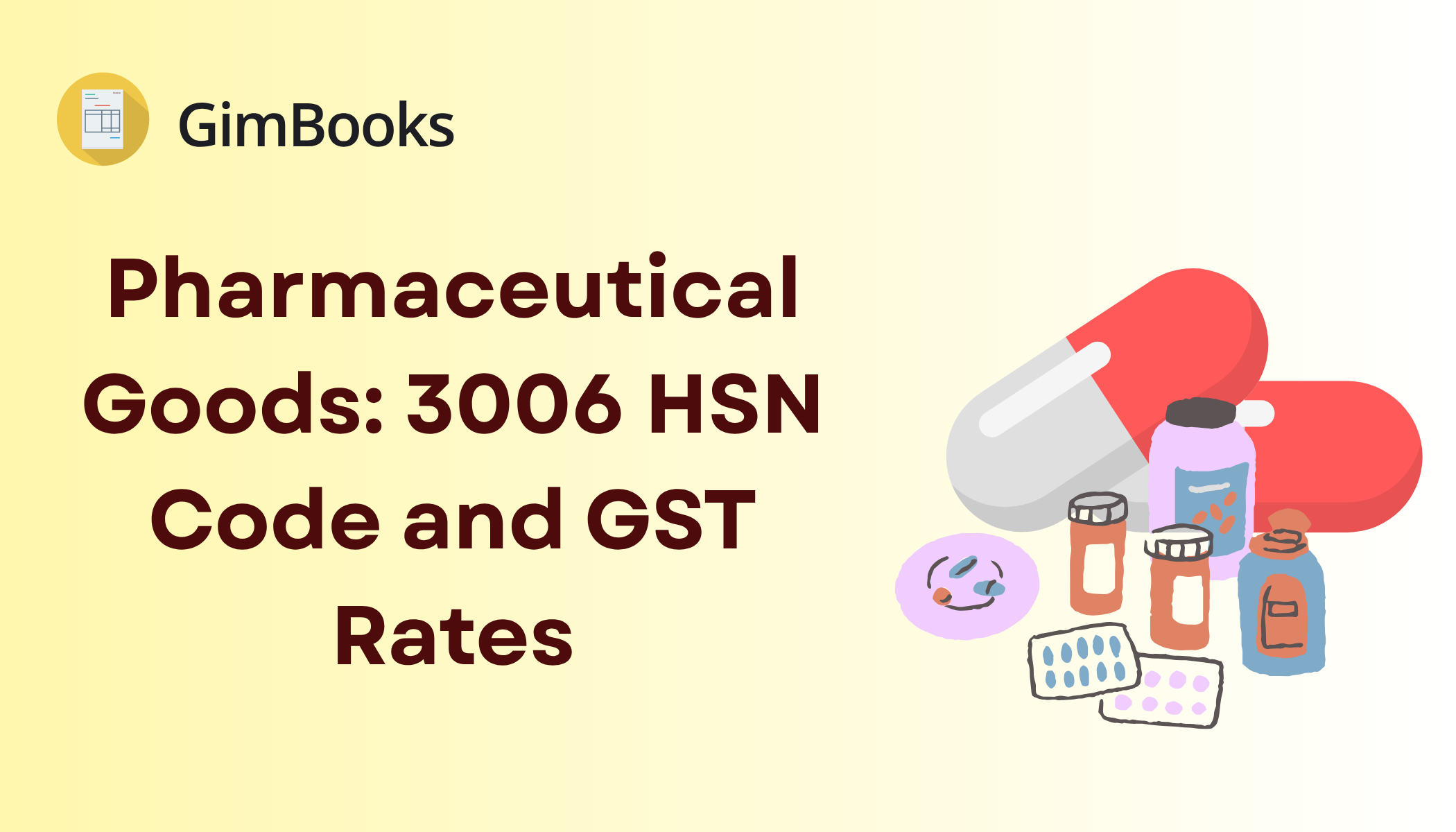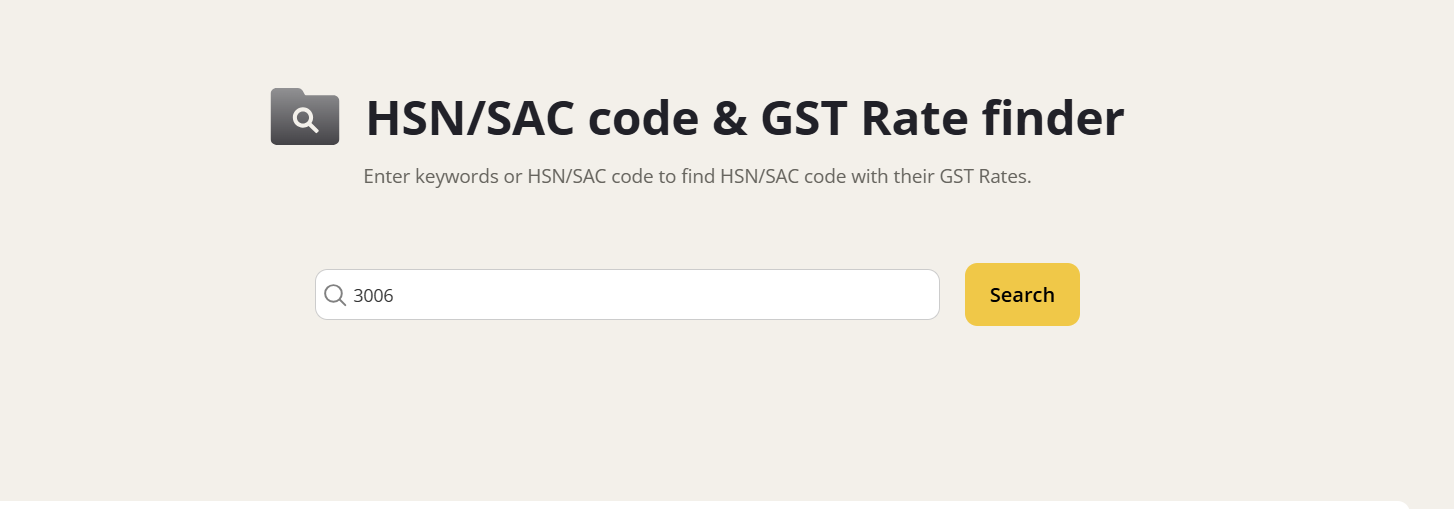Pharmaceutical Goods: 3006 HSN Code and GST Rates

What is HSN Code 3006?
HSN Code 3006 refers to “Pharmaceutical Goods Specified in Note 4 to Chapter 30.” This category includes specialized medical and diagnostic products such as sterile sutures, surgical catgut, dental cements, contraceptive devices, blood grouping reagents, opacifying preparations for X-rays, and first-aid kits.
Essentially, these are non-medicinal but medically critical goods that support surgical, diagnostic, and preventive procedures in hospitals and clinics.
Common examples include:
- Sterile surgical sutures
- Dental fillings and reconstruction cements
- Diagnostic and X-ray reagents administered to patients
- Sterile gel lubricants used for medical examination
- Contraceptive supplies and medical kits
GST Rates & Exemptions for Pharmaceutical Goods (HSN 3006)
As per the new GST rate reforms effective from 22 September 2025, the government simplified rates to promote affordability of healthcare essentials. The GST rate for most goods under HSN 3006 has been reduced to 5%, with select higher-value or commercial diagnostic reagents taxed at 12%.
Key highlights of the 2025 changes:
- Lifesaving and critical medical products: 0% GST (e.g., contraceptives, blood components)
- Common pharmaceutical goods: 5% GST (e.g., sutures, diagnostic gels)
- Special diagnostic reagents and dental cements: 12%
- No compensation cess under Chapter 30
Table Notes
- The rate disparity (5% and 12%) depends on the medical utility and manufacturing nature of each product.
- Life-saving and contraceptive items continue to enjoy GST exemption (0%) for public healthcare accessibility.
- Input Tax Credit (ITC) is available for eligible manufacturers and distributors of taxable goods (5% or 12%).
GST Rates Applicable Under 3006
(Rates aligned with GST Council reforms of September 2025 and CBIC classification).
What’s Included in HSN 3006 Pharmaceutical Goods?
Products under HSN 3006 are medically essential but not considered drugs. They include all specialized pharmaceutical preparations used for treatment assistance, surgical support, or diagnostics, such as:
- Sterile surgical supplies (sutures, implants, hemostatic materials)
- Dental and orthopedic prosthetics and reconstruction kits
- Medical reagents used for diagnostics and imaging procedures
- Sterile lubricants & surgical gels for examinations
- Contraceptive substances based on hormones or spermicides
- Healthcare kits like first-aid boxes and blood reagents
These goods are designed to meet clinical hygiene and professional-grade manufacturing standards, as specified in Note 4 of Chapter 30

Explore Gimbooks HSN/SAC code & GST Rate finder
Key Exemptions Under GST for HSN 3006
The GST Council’s 56th meeting in September 2025 expanded exemptions and reduced rates on healthcare products to promote affordable healthcare access. Current exemptions under HSN 3006 include:
(Exemptions highlighted under GST Council notifications for affordable healthcare, 2025)
Input Tax Credit (ITC) Rules for Pharmaceutical Goods
Businesses dealing in taxable pharmaceutical goods (5% or 12%) can claim ITC under GST for manufacturing, packaging, and distribution costs. ITC ensures efficient tax management across the healthcare value chain.
ITC Eligibility:
- Pharma manufacturers/distributors can claim ITC on raw materials, packaging, and logistics where GST is paid.
- No ITC allowed for products exempted from GST (0% category).
- Partial ITC applies to dual-rate turnover (5% & 12%).
- ITC must be filed under Form GSTR-3B and reconciled through ITC-02 if transfer of business occurs.
Example:
A diagnostic reagent manufacturer pays ₹50,000 as GST on inputs and sells reagents worth ₹10,00,000 at 12% GST (₹1,20,000). The available ITC (₹50,000) can be offset against output liability, reducing net tax payable to ₹70,000.
GST on Pharmaceutical Goods: Practical Scenarios
- A hospital supplier selling sterile surgical sutures (30061010) applies 5% GST, with ITC claims on packaging materials.
- A diagnostic laboratory importing contrast reagents (30063000) is charged 12% GST under import classification.
- A retail pharmacy distributing contraceptives (30066010) bills at 0% GST, with no ITC eligibility.
- A dental equipment manufacturer producing prosthetic cement kits (30064000) pays 12% GST and claims input credits.
Common Mistakes in Pharmaceutical GST Classification
- Classifying medical-grade diagnostic reagents under general medicines (3004) rather than specific HSN 3006.
- Charging uniform 12% GST without verifying 0%, 5%, and 12% sub-categories.
- Claiming ITC for exempted goods like contraceptives or blood components.
- Ignoring chapter-specific notes refining the classification of pharmaceutical vs. medical-grade devices.
Conclusion
The HSN Code 3006 serves as the backbone for GST classification of pharmaceutical goods beyond standard drug formulations. Under the 2025 revised GST rate system, these goods attract 0%, 5%, or 12% GST—depending on utility and listing. The reduced tax structure emphasizes healthcare affordability, boosts domestic manufacturing competitiveness, and supports India’s move toward a globally recognized medical ecosystem.
Also explore
- Contract HSN Code 9954
- Medicine HSN Code 3004 GST Rate
- 9987 HSN Code and GST rate
- Service Charge HSN Code 9983
FAQs: HSN Code 3006 & Pharmaceutical Goods GST
What is HSN Code 3006?
It covers specialized pharmaceutical goods like surgical sutures, dental cements, reagents, gels, and contraceptive products.
What are the GST rates for HSN 3006?
Goods under HSN 3006 are taxed at 0%, 5%, or 12% depending on product category and usage type.
Are contraceptives exempt under GST?
Yes, all contraceptives (hormonal, chemical, or spermicidal) are exempt from GST.
Can manufacturers claim ITC on pharmaceutical goods?
Yes, ITC can be claimed on taxable goods (5% or 12%) but not for exempt (0%) items.
Are diagnostic kits and reagents covered under 3006?
Yes, diagnostic reagents and contrast materials for medical imaging fall under HSN 30063000 with 12% GST.
